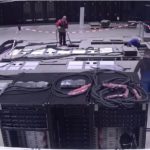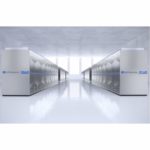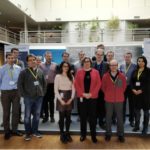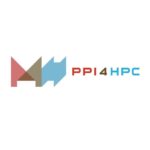Today the Jülich Supercomputing Centre in Germany announced 32.4 million euros in funding for continued research into such diverse areas as quantum computing and neuromorphic computing. “With the new JUWELS system, the research center has a supercomputer that is one of the fastest in the world. Already sought after by researchers from all over Europe, the supercomputer is even used for simulations in brain research, such as the European Human Brain Project.”
Time-Lapse Video: Building the New JUWELS Supercomputer in Germany
In this time-lapse video, engineers at the Jülich Supercomputing Centre begin building the new JUWELS supercomputer. “When it comes to developing innovative supercomputer architectures, Europe is about to take the lead. A striking example of this is the new supercomputer that is due to start user operation at the Jülich Supercomputing Centre in the next few days.”
Job of the Week: Research Scientist specializing in HPC Processor Architectures at Jülich
The Jülich Supercomputing Centre (JSC) is one of the three national supercomputing centres in Germany. It is partnering with leading technology providers on co-design hardware architectures for future supercomputers. In this context we research on current and future ARM-based architectures for high-performance computing. The research will be performed within the European project “MB2020”.
Atos to Deploy 12 Petaflop Supercomputer at Jülich in Germany
Today Atos announced has a contract to deliver its a 12 Petaflop supercomputer to Forschungszentrum Jülich in Germany. The BullSequana X1000 machine will be Germany’s fastest supercomputer and one the most powerful computers in the world. “Among numerous other activities, the BullSequana will be used in research for the Human Brain Project, which has as its goal to improve the understanding of the processes in the human brain through simulation.”
Jülich Supercomputer Adds 5 Petaflop Booster Upgrade from Dell EMC
The JURECA supercomputer in Germany just got a major upgrade with help from Dell EMC. “Thanks to the additional 5 petaflops, the Jülich supercomputer now appears as one of the fastest computers in Europe on the TOP500 list of the fastest computers in the world. This is the first time that a supercomputer with an innovative modular architecture has gone into productive operation worldwide.”
Deep Learning in the Spotlight at ISC
This year the ISC conference dedicated an entire day to deep learning, Wednesday, June 21, to discuss the recent advances in artificial intelligence based on deep learning technology. However it, not just the conference where deep learning was dominating the conversation as the showfloor of the exhibition hosted many new products dedicated to optimizing HPC hardware for use in deep learning and AI workloads.
European Supercomputing Centers Adopt Joint Procurement Process
Some of Europe’s leading supercomputing centers have joined forces to create a buyers group that will enable joint public procurement of new HPC systems. “The new partnership of four public HPC centers (BSC, CINECA, JSC, and GENCI), located in four different countries (Spain, Italy, Germany, and France) means that new supercomputers can be procured through a market consultation for the purchase of HPC systems. This group will operate under as part of the Public Procurement of Innovative Solutions for High-Performance Computing (PPI4HPC) project.”
DEEP-EST Project Looks to Building-blocks for Exascale
The DEEP exascale research computing project has entered its next phase with launch of the DEEP-EST project at the Jülich Supercomputing Center in Germany. “The optimization of homogeneous systems has more or less reached its limit. We are gradually developing the prerequisites for a highly efficient modular supercomputing architecture which can be flexibly adapted to the various requirements of scientific applications,” explains Prof. Thomas Lippert, head of the Jülich Supercomputing Centre (JSC).
Video: Towards the Decoding of the Human Brain
Katrin Amunts from Jülich presented this keynote at the PASC17 conference. “The human brain has a multi-level organization and high complexity. New approaches are necessary to decode the brain with its 86 billion nerve cells, each with 10,000 connections. 3D Polarized Light Imaging, for example, elucidates the connectional architecture at the level of axons, while keeping the topography of the whole organ; it results in data sets of several petabytes per brain, which should be actively accessible while minimizing their transport. The Human Brain Project creates a cutting-edge HPC- and HPDA infrastructure to address such challenges including cloud-based collaboration and development platforms with databases, workflow systems, petabyte storage, and supercomputers.”











